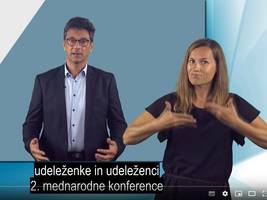Today, 10 June 2022, the Ombudsman, Peter Svetina, addressed the participants of the 2nd international conference "Contemporary Challenges of Working with At-Risk Youth". The Conference, held at the Radenci Health Resort, was organised by the Jarše Youth Centre.
The Ombudsman stressed that the protection and care of young people from vulnerable groups, especially children and adolescents with emotional and behavioural disorders and problems, is not a topic at the centre of society's attention. "Due to the legacy of inadequate living conditions or developmental problems, children and adolescents are unable to adapt to the system. In their search for their lost inner peace, they often undermine it. Therefore, the system providing them safety must be clearly structured, not malnourished, full of professional competence as well as empathetic humanity. Taking care of the vulnerable is a big job," he stressed.
He added that many children unfortunately do not have proper conditions for development. Therefore, the State has to intervene in their care and protection. This is also an area overseen by the Ombudsman. The National Preventive Mechanism also notes that an increasing number of children and adolescents in specialised centres need more and more help or more structured and intensive help or therapeutic treatment. The employees at these centres often deal with different types of addictions, mental health disorders, other serious emotional and behavioural disorders, and are confronted with challenging situations of violence, which can be directed inwards or outwards.
In its reports on visits to specialised centres, the National Preventive Mechanism has already expressed its support of the entry into force of the Act Governing the Treatment of Children and Adolescents with Emotional and Behavioural Problems and Disorders in Education. According to this Act, these centres also have the option to set up assertive groups for children and adolescents in need of more intensive assistance or therapeutic treatment. Additionally, the National Preventive Mechanism called on the Ministry of Education, Science and Sport to, in cooperation with other relevant ministries, take a more active approach to solving the more difficult problems faced by specialised centres when dealing with children and adolescents. The National Preventive Mechanism also recommended that the Ministry help them set up assertive groups and treatment programmes in such groups.
“Intense relationships require a lot and more from all who enter into them. In order for staff to be able to give their full attention to a child or adolescent who needs intensive attention, it is essential that groups are small. The National Preventive Mechanism has therefore also recommended that the Ministry of Education, together with specialised centres for children and adolescents with emotional and behavioural problems and disorders, examine the need to change the criteria i.e. the standards for the formation of groups for these children and changes them accordingly. I expect that the recommendations of the National Preventive Mechanism will be taken into account", said Ombudsman Svetina.
He also stressed that there is a strong need for prolonged care for these vulnerable children and adolescents once they are formally adults, and for their systematic and gradual integration into society, supported by appropriate institutions and by monitoring of their progress. There is also a need for a more intensive approach to deinstitutionalisation and the integration of these children and adolescents into community care. "This will enable them to have a better quality of life", stressed the Ombudsman.
"The children and adolescents that our colleagues from the National Preventive Mechanism meet say that they are fine where they are, but most would rather be at home with their families. As a society, we will have to address much more intensively than we have done so far questions about how to support families in caring for their children, so that we do not just deal with the consequences, but at the same time do not interfere with families’ integrity," said the Ombudsman, adding that we as a society have not yet exhausted all the possibilities in caring for children and adolescents with emotional and behavioural disorders, which will be explored by the participants at the two-day international conference.
"I hope that the topics discussed will enrich you, and give you motivation in your work or ideas for improvement and progress. I also hope that you will continue to support with your vigour those who, without you, would be at the mercy of the circumstances in which life has placed them," concluded Ombudsman Peter Svetina.
